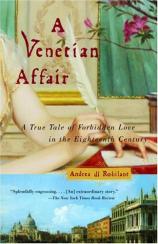Reading Group Guide
Discussion Questions
A Venetian Affair: A True Tale of Forbidden Love in the 18th Century

1. "Some years ago my father came home with a carton of old letters that time and humidity had compacted into wads of barely legible paper" [p.3]. For di Robilant, this book is not mere historical research, but a tribute to his father and his family. Andrea Memmo is his ancestor. Does the author's style of narration reflect his identification with the characters?
2. What are the elements of romance in this story? What is the significance of clandestine love, intercepted letters, delayed gratification, and fantasy in Giustiniana and Andrea's love affair? How might their strong and long-lasting attachment have been different if they had been allowed to marry?
3. In di Robilant's intimate portrait of eighteenth-century Venice, marriage is not the private or romantic affair that it is today. Instead, it was a highly political institution on which the foundation of the Venetian Republic rested. Why was marriage considered so important that it required government approval? In what way would a marriage between Andrea and Giustiniana have threatened the rigid Venetian social order and the political establishment of the time?
4. Both Andrea and Giustiniana are products of their time, place, and social class. But while Andrea is very much a creature of late eighteenth-century Venetian politics, Giustiniana develops into a highly intellectual woman with nineteenth-century Romantic views. "You have to cultivate the Venetian spirit, its genius, its weaknesses, and I don't --- though I can accept all these attitudes and prejudices in you," she writes to Andrea [p. 259]. What is the significance of this statement? How does this difference play out between them?
5. The love affair between Andrea and Giustiniana is "secret," but never really private or merely personal. In what ways do their attempts to be together intersect with important political changes in Venice, Paris, and London?
6. Several schemes are hatched to marry Giustiniana off to older, wealthy men with the understanding that she would be able to see her lover freely. All of these plans fall through. As she matures, she writes, "The idea of marriage scares me more and more. I would never marry a man I admired so as not to make him unhappy. And I would never marry one I despised so as not to make us both unhappy" [p. 218]. Yet both she and Andrea eventually give in to the traditional marriage of convenience. In what way is this choice different for each of them? Did the Venetian reliance on outward social propriety mask a moral system, which was perhaps more permissive in some ways than today's?
7. These two lovers are very skilled writers. Giustiniana eventually becomes a published writer and novelist, admired by her famous friend Casanova. Does Giustiniana's evolving skill as a writer eclipse Andrea's? What stylistic devices does she employ in her letters to hold her lover's interest when she feels it waning?
8. In each of the cities that Giustiniana visits in her flight from Venice, she becomes embroiled in politics to various degrees, yet, as di Robilant writes, "She seldom described the political scene for Andrea even though he would surely have been very interested in it. She did not have a taste for politics. Her taste was more for observing society" [p. 235]. In what ways are society and politics separated in this story? How do women express ambitions and exert power differently than men?
9. What is the role of gossip in this story? How does it affect Giustiniana's fate, as opposed to her lover's, to be "the talk of the town" everywhere she goes? How do scandal and intrigue function differently for different social classes in the culture of the time? Why is official respectability so important to Giustiniana's mother?
10. "One is made to feel so isolated in this grand society," Giustiniana writes from London, "What a life!" She looks for female friends, but confides in Andrea, "You cannot imagine the degree to which they are malicious. Friendship does not exist among them. . . . I could never become a friend of any of them, and so I treat everyone well and pay many compliments" [pp. 225-26]. How did eighteenth-century society isolate and divide women? What are some of the consequences of such divisions?
11. How does all the struggle and scheming that Andrea and Giustiniana go through in their attempts to be together educate them in the ways of society and prepare them for their future lives?
12. Andrea becomes an important player in the politics of the late Venetian Republic and is almost elected Venice's last doge. Giustiniana, for all her attempts to penetrate the upper echelons of society, remains an eccentric outsider. Yet both are successful in different ways. How do their different forms of success come about both because of, and in spite of, their different social classes?
13. When the separated lovers make plans for Giustiniana to attract and then marry two older gentlemen, are they justified? Are their actions immoral? Is it fair to apply today's cultural attitudes and mores to these young people of a different place and time?
14. Andrea, we learn, was present at Giustiniana's death bed. What was it that made their youthful passion grow into a lifelong bond? Beyond infatuation and physical desire, what connection did these two ultimately share?
15. How does A Venetian Affair illuminate contemporary attitudes toward love and marriage?
A Venetian Affair: A True Tale of Forbidden Love in the 18th Century
- Publication Date: April 12, 2005
- Paperback: 320 pages
- Publisher: Vintage
- ISBN-10: 0375726179
- ISBN-13: 9780375726170







